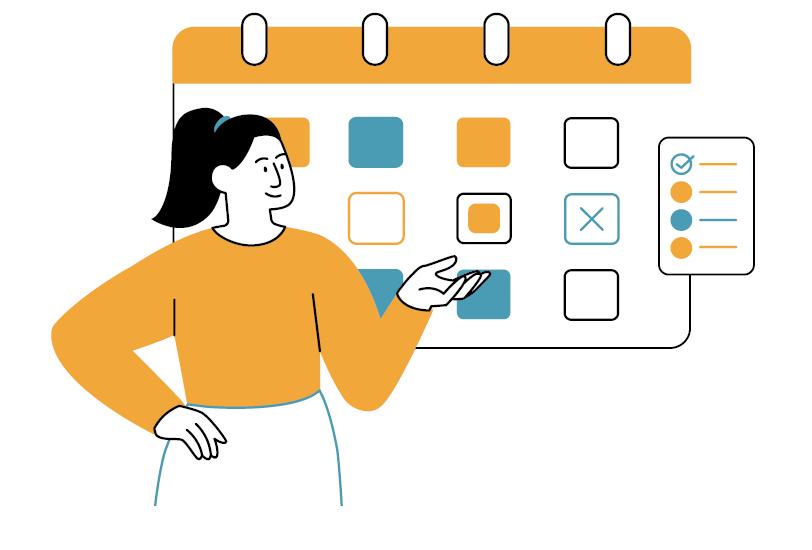Newcomer Youth Employment Toolkit
- Module 6 Workshop -



The intention of this workshop is to:
● Think about your future and support you in putting those dreams into action
● Help you to balance school with work and other responsibilities

● Support you in identifying and managing stress, and maintaining your health
● Remind you to have fun and the importance of not forgetting about what you enjoy
3 Things in Common:
● You will be split into groups of 3-4
● You have 3 minutes to chat with each other and identify at least 3 things you all have in common
Debrief:
● Each group will share what their commonalities are and which one surprised them the most
● Everyone vote on which group had the strangest or most surprising commonality



Goal: “The object of a person’s ambition or effort; an aim or desired result”.
● What is a goal you set recently?
● Did you achieve it?
● How do you know?
Goal setting has many benefits including:
o Improving self-image (how you perceive yourself/your self-worth, recognizing why you are a valuable human)
o Increasing awareness of one’s strengths and weaknesses (recognize what you are good at and where you can improve)
o Facilitating effective visualization and prioritization (how you envision your future and prioritize action steps)
o Bringing wishful thinking to real action planning (plan out the education and steps you need to achieve your dreams)
o Building self-responsibility and accountability (stick to your action plan, for example - a career plan and tracking your progress)
o Improving decision making abilities (when you know what you want and how to get it, you can make decisions that follow that path)
When it comes to setting employment goals, there are certain things to think about:

● What do I want to be/what do I want to do for work?
● What education do I need to do this job?
● Which experiences would be relevant to this job?
● Which skills should I gain or improve on to do this job?
● What steps can I start taking now to be a strong candidate for this job?
● How can I reward myself or celebrate each step I take toward achieving my goal?
When we think about goals, we can consider education, work, relationships, travel, and so many other goals that we may have for ourselves. But once we determine our end goals, what do we do?
Goal setting involves breaking down our larger goal into smaller, specific, measurable, attainable, realistic, and time-bound actions. This is known as: SMART goals

Use the SMART structure to write your goals down to plan what you want to do and how you will know you have accomplished it!
S - Specific What do I want to accomplish? Having a career in biology and a job working in a lab
M - Measurable How will I know when it is accomplished? 10 years from now I will have earned my university degree and have a job in a lab
A - Achievable How can the goal be accomplished? I will work hard in my high school science and math classes, and apply to universities
R - Relevant Why does this seem worthwhile? My dream is to become a successful biologist
T - Timebound When can I accomplish this goal? I graduate in 2 years and then an undergraduate degree is 4 years, so this can be accomplished by 2030

"I have to start pushing myself harder to achieve my goals... I have to work on myself, do more research... I also need to manage my time [better]that's a big issue I find."

"Researching or looking into the topic of what is interesting to you. I chose science and math to help me with what I want to do."
"I have to study what they do. How they read, sleep, manage time, how they improve their confidence, how they talk – if you know what they do, you can start being like them – the person you want to be in the future."

1. Setting specific and realistic goals works best (re: SMART goals)
2. It takes time to create good habits - be patient
3. Repeating a goal makes it stick - say it out loud everyday
4. Set goals for yourself and not to please others
5. Roadblocks happen - start again
https://kidshealth.org/en/teens/goals-tips.html#catexercise

So, let’s go back to that question: What do you want to do every day?
● Think beyond high school and about your post-secondary journey (college, university, trades)
● Think about the life you want
Visualization
(from Module 3 - is creating a mental image of something positive, an outcome we are hoping for, a relaxing scene, and so on)
The theory: visualizing a positive outcome will bring positive things or help us feel calm in stressful situations
Example: Think of your goal (example: doing well in the interview)
Picture the scenario
(example: I walk into the office confidently and introduce myself. Everyone is well dressed. There is a desk and chairs for us to sit. The hiring manager gestures for me to sit in the chair near the desk. The hiring manager asks me to tell them about myself and I feel confident because I have prepared for this question. I start to tell them about my past and present experiences. I talk about my interests and how this relates to the job I am interviewing for...)
● Use the space in your workbook to create a mini vision board
● Take 15 minutes and use images, drawings, or words to create your ideal future and what you want to work towards.
o Ask yourself:
▪ Where are you in life now? What have you learned, achieved, or feel grateful for?
▪ What areas of life do you want to include in your vision board?

▪ What are your personal values? What is important to you and why? What inspires you?
▪ What do you want to do? Why do you want to do those things? How would you prioritize them?
● Group Debrief: Everyone gets one minute to share their vision board with the group

The next steps in shifting from your vision and wishful thinking into action are:
● Establish your goals that will achieve your vision
● Breakdown the goals into the SMART structure
● Work on your action items
● Celebrate your progress!


How do you feel when thinking about the future?

(circle all that apply and add your own in the blank spaces) excited nervous optimistic courageous overwhelmed energetic happy calm curious confident worried impatient anxious
Why do you think you might be feeling this way?
If you are unsure of your future career goals, start to explore your interests. Think about what you like to do and look for opportunities to do it.

You can clarify your interests and skills by
● Making a list of what you can think of
● Taking an assessment like:
https://www.jobbank.gc.ca/workpreference
● Additional resources include:
○ https://www.jobbank.gc.ca/career-planning/quizzes
○ https://www.jobbank.gc.ca/career-planning/searchjob-profile
○ https://www.jobbank.gc.ca/career-planning/skillsknowledge
There is a handy tool that will help you plan your future career by showing you what is needed to qualify for the job you are interested in
Job Profile Tool:
https://www.jobbank.gc.ca/career-planning/search-job-profile
Look up job profiles by entering the field or job title you are interested in. This website will show you what the job is, pay information, current jobs available, and more

When planning your post-secondary education, you must have an understanding of what education requirements exist for the career you want.
To find out what education is required for the career you are interested in, visit: https://www.jobbank.gc.ca/career-planning/search-field-of-study
Are you interested in full-time or part-time post-secondary education?
Colleges and universities have diversified their offerings in education to include full and parttime studies, as well as in person and online options. Financial capabilities and family commitments can factor into these types of choices. There are financial supports for both, but it is important to explore all options and the supports available.
Once you have what education is required of the career you want you can explore your options for obtaining the diploma or degree required, which schools offer it, and the financial options available.
For more information on college, university, post-secondary education in Canada, visit: https://www.canada.ca/en/immigration-refugees-citizenship/services/new-immigrants/new-lifecanada/education/types-school/post-secondary.html

To work in the trades you need:

● Professional training/work experience
● Qualification assessments
● Certifications
Red Seal Endorsement (RSE). The RSE is a highly valuable professional designation that allows you to practice your trade anywhere in Canada. The Red Seal Program creates common standards and examinations for provinces and territories and covers 54 trades in Canada. Explore the Red Seal Trades and take your career where you want it to go.
● Financial Support is available for Red Seal Trades
For more information on different trades, training and financial support, visit: https://www.canada.ca/en/employment-social-development/campaigns/skilled-trades.html



Good work and life balance means meeting your school and job requirements while also being able to do the things you enjoy doing outside of work, school and other obligations.
What puts us out of balance?
● When something in life is demanding more of our energy, focus, and time than other things
● When the things we enjoy and that are good for us are not an equal priority to other things we need to accomplish
● When we feel dissatisfied with life
A tool that is often used to assess life balance is called the wheel of life
There are different versions you can google search “wheel of life” or “kids wheel of life”

Rate the following categories from 0 - 10 (0 meaning you are not feeling great about the time or effort you are putting into this area of your life, and 10 being that you are in an ideal state in that area of your life and are really happy with it), and then why you chose that rating.
On a scale of 0-10, how will you rate your...?
● Physical health
● Emotions
● Relationships
● Environment
● School & work
● Spirituality
● Creativity and thinking
Physical Health Includes nutritional health, body image, sleep, physical activity, sexual health
Emotions Awareness of your feelings, ability to manage stress and emotions, outlook on life, acceptance of yourself, etc.
Relationships Family, support systems, and your ability to communicate your feelings to those around you
Environment Your home and living conditions, your adaptability to change, how you feel about your community, your connection to elements of nature
School & Work
How interested and satisfied you are in work and school, your goals and attitude, your perceived ability to contribute to your community and family
Spirituality
Your sense of belonging in the world, the meaning and purpose you feel for your life, the comfort you get from nature, the universe, a higher power, or religious faith and beliefs
Creativity & Thinking
How you express yourself, exercise your mind, learn from others and the world around you, your appreciation for learning new things etc.

Everyone share an area or two that appears out of balance on the wheel
1. Use an agenda to keep track of homework, tests, and other activities
2. Check your class schedule to know where to go and when (this can also help remind you of any assignments)
3. Before going to bed, prepare your outfit, pack your backpack, pack your lunch, and prepare your bus fare
4. Keep a healthy sleep routine (8-10 hours ideally)
5. Set goals for your classes to prioritize tasks
6. Participate in school events, clubs, programs, and other activities
7. Use the resources available to you – meet the School Settlement Worker that may be working at your school
8. If you are in college/university, take advantage of flexible schedules (night classes, online classes...), resources and services (childcare), and so on
9. Find ways to manage stress
10.As you manage your time, carve out time for fun too!
1. Be realistic about the hours you can work
2. Talk to your supervisor/manager about flexible work schedules (reduced hours, availabilities)
3. Try to find a job that aligns with your short and long-term goals
4. Take your breaks, eat your lunch/supper, and get enough sleep
5. Prepare your clothes the night before
6. Plan your transportation and prepare bus fares the night before
7. Check-in with yourself about stress, sleepiness, and whether you're staying on track with school, work, and other areas of life
8. Find ways to manage stress and keep healthy habits like a consistent sleep routine


Maintaining physical health is important for your immune system, energy levels, and ability to focus
The key things to taking care of physical health:

Regular exercise:
• Supports better sleep
• Lowers stress hormone production
• Lowers chances of anxiety/depression
• Helps prevent diabetes and disease
• Supports better aging, lowering age related disease, and health conditions
Types of exercise:
• Walking and running
• Weightlifting
• Cardio
• Swimming
• Sports
Sleep is crucial for mental and physical health, you brain recharges and stores information, your body rests, and your immune system is supported.
Teens should be getting 8-10 hours of sleep every night and sometimes that can be challenging.

5 tips for better sleep:
1. Be active during the day
2. Avoid caffeine near bedtime
3. Say goodnight to electronics
4. Keep a sleep routine
5. Expect a good night’s sleep
Resource: https://kidshealth.org/en/teens/tips-sleep.html#cattake-care
Common sleep problems:
https://kidshealth.org/en/teens/sleep.html#cattake-care


Good Stress = motivates, energizes, feels exciting, and actually improves your performance and is usually short term
Bad Stress = causes anxiety or concern, feels unpleasant, decreases performance, and can lead to mental and physical problems
It is important to understand your personality and stressors, assess yourself when you start to feel stressed and monitor your reactions in situations so you know when to keep yourself in the “good stress zone”


1. Wait 6 seconds - when you have a stressful thought, your brain starts increasing the production of stress hormones called adrenaline and cortisol (It takes 6 seconds for your brain to process the thought and start producing endorphins to counteract the stress hormones)
2. Take a break and some deep breaths and come back to what is stressing you - whether it is a task or a conversation, pause and return to it later
3. Talk about your stress or write it out - expressing your thoughts can help clarify stress triggers and alleviate perceived stress
4. Get moving – exercise is a great way to reduce stress
• If you're in immediate danger or need urgent medical support, call 911
• If you or someone you know is thinking about suicide, call Talk Suicide Canada at 1-833-456-4566. Support is available 24/7
• Visit Talk Suicide Canada for the distress centres and crisis organizations nearest you
• If you're experiencing gender-based violence, you can access a crisis line in your province or territory
Kids Help Phone
• Call 1-800-668-6868 (toll-free) or text CONNECT to 686868
Available 24 hours a day, 7 days a week to Canadians aged 5 to 29 who want confidential and anonymous care from trained responders
• Visit the Kids Help Phone website for online chat support or to access online resources for children and youth
• To connect with a mental health professional one-on-one: call 1-888-668-6810 or text WELLNESS to 686868 for youth call 1-866-585-0445 or text WELLNESS to 741741 for adults
• You can also visit Wellness Together Canada to access different levels of support, including one-on-one counselling, credible articles and information, self-guided courses and programs, and peer support and coaching
• Government of Canada Public Health
https://www.canada.ca/en/public-health/services/mental-health-services/mental-health-gethelp.html
Making time for the things you enjoy is key to maintaining physical and mental health, and manageable stress levels
How to ensure you have time for fun, here are some tips and strategies for managing your time:
o Plan your day the day before
o Categorize and identify priorities
o Set daily goals, try a to-do list
o Set specific times with deadlines for each activity
o Start with the most important/most difficult thing to get it out of the way
o Keep your phone and other distractions away
o Schedule breaks for yourself
o Use a calendar, agenda, or time/activity tracking apps
o Identify things that waste your time or distract from priorities
o Find a system that works for you – stay organized
o Celebrate and reward yourself for accomplishing things
Here are some ideas on how to incorporate fun into your life https://www.canada.ca/en/immigration-refugeescitizenship/services/new-immigrants/new-life-canada/community-connections.html



